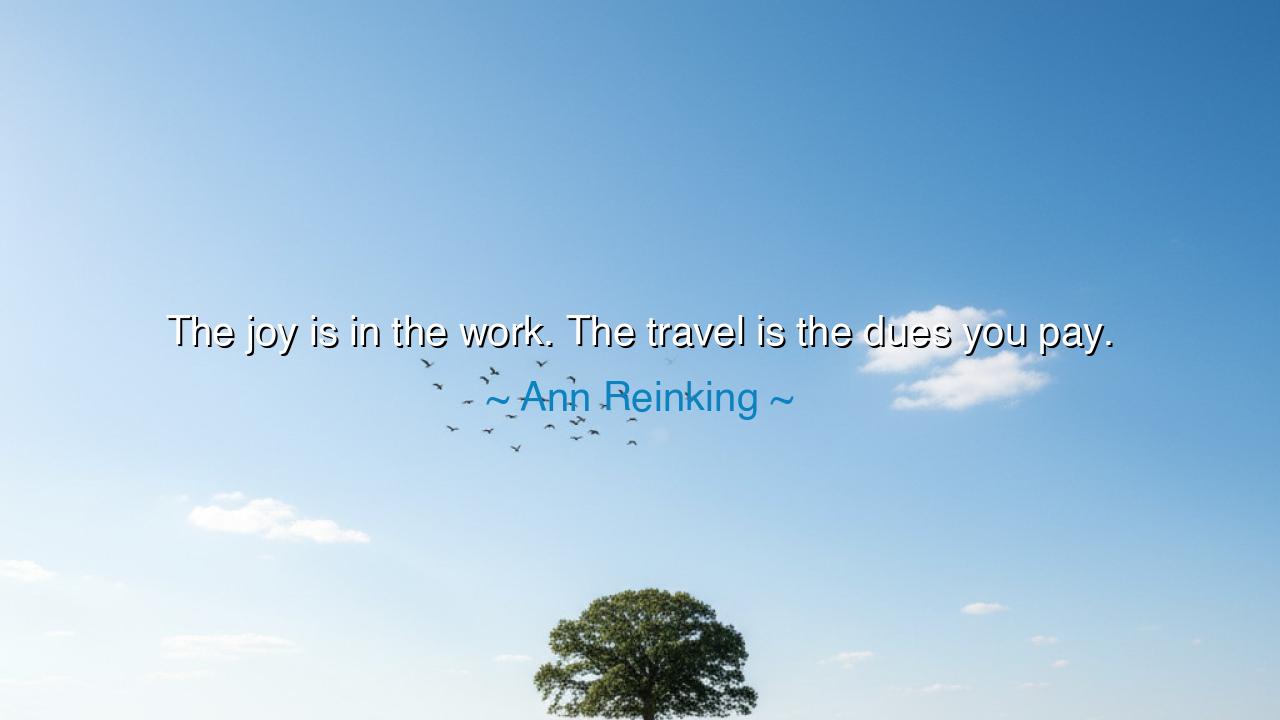
The joy is in the work. The travel is the dues you pay.






The words of Ann Reinking, dancer, choreographer, and bearer of the stage’s flame, ring with the clarity of eternal wisdom: “The joy is in the work. The travel is the dues you pay.” These are not idle syllables but the utterance of one who has walked the long road of devotion, who has given her body, her time, and her spirit to the pursuit of art. Within them lies a truth as old as labor itself—that the sweetest fruit of life is found not in the applause, nor in the glitter of the destination, but in the very work of creation. The toil is not the enemy of joy; it is joy itself. What burdens we carry outside that sacred work—the weariness, the journeys, the distances—are the dues we must offer, like incense upon the altar of mastery.
Think of the farmer of ancient times, tilling the soil from dawn until the stars appear. His body aches, his skin burns, his back bends—but his heart is full, for each furrow he carves is the promise of harvest. The act of labor, humble yet divine, is its own satisfaction. Yet, beyond his field lies the market, the city, the long road upon which he must walk to trade his grain. This journey is tiresome, yet it must be done, for without it, his labor has no witness, no exchange, no recognition. In the same way, Reinking reminds us that the work itself holds the joy, while the travel, the endless movement demanded by duty, is merely the price we pay to bring our work into the world.
Consider also the tale of Michelangelo, who climbed the scaffolds of the Sistine Chapel for years, his neck strained, his body contorted, his hands blistered from unyielding labor. In those long hours of solitude, there was no audience to cheer, no glory to crown him—only paint, plaster, and the silent dialogue between artist and creation. That was his joy. Yet, when summoned by Pope Julius II, he could not refuse. He had to endure the politics, the endless calls to court, the journeys between cities, the restless demands of patrons. These were his dues, the wearying cost that allowed his work to shine upon the dome of heaven.
There is a heroic power in this teaching. For it reveals that happiness does not lie at the far end of a journey, nor in the external trappings of success, but in the sacred present moment of labor. The dancer feels it in the sweat of rehearsal; the writer feels it in the scratch of pen against parchment; the craftsman feels it in the steady rhythm of hammer and chisel. This is the wellspring of fulfillment. But the roads, the delays, the burdens of travel—these must be endured with patience, for they are but the toll gates we pass on the way to offering our gifts to others.
Yet how often do mortals confuse the two? They long for the stage but scorn the rehearsal; they hunger for recognition but flee the journey. Such souls grow bitter, believing the hardship overshadows the joy. But Reinking, in her wisdom, reveals the truth: hardship is but the tax, the shadow cast by the radiant flame of work. To mistake the shadow for the flame is to lose sight of the divine essence of labor.
The lesson, then, is simple yet profound: cherish the work itself, for it is the source of your joy. Let travel, sacrifice, and inconvenience be met with calm acceptance, knowing they are but the dues that life demands. Do not curse the journey, but walk it with steady feet, for it is the bridge that carries your work into the eyes and hearts of others.
To the seekers of wisdom, take these practical actions: Each day, pour yourself into your craft, whether it be the art of teaching, building, healing, or creating. Find in the labor not a burden but a blessing. And when you are called to travel—whether across miles of land, across dull hours of waiting, or through trials of circumstance—bear it with patience, remembering it is only the price that guards the treasure. Place your heart where it belongs: in the work, in the sacred act of doing. There you will find joy that no distance, no dues, no weariness can steal away.
For in the end, generations will not remember the hours of your travel, nor the roads you walked to deliver your gift. They will remember the work itself—the art, the labor, the creation born of your devotion. And that, eternal and shining, is where your joy will live forever.






AAdministratorAdministrator
Welcome, honored guests. Please leave a comment, we will respond soon